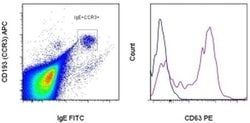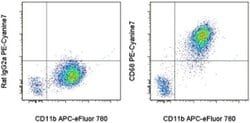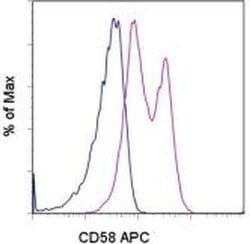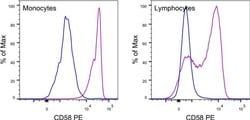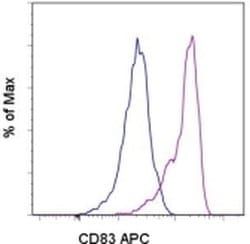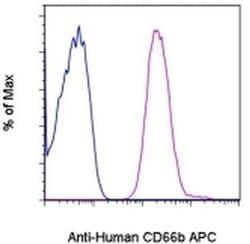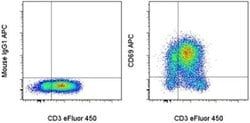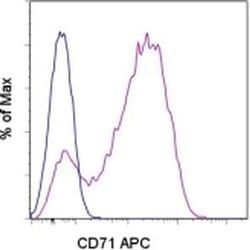7090052
CD63 Monoclonal Antibody (NVG-2), APC, eBioscience™, Invitrogen™
Rat Monoclonal Antibody
Manufacturer: Fischer Scientific
The price for this product is unavailable. Please request a quote
Antigen
CD63
Concentration
0.2 mg/mL
Classification
Monoclonal
Form
Liquid
Regulatory Status
RUO
Formulation
PBS with 0.09% sodium azide; pH 7.2
Gene Alias
C75951; CD 63; Cd63; CD63 antigen; CD63 antigen (melanoma 1 antigen); Cd63 molecule; CD63 protein; granulophysin; LAMP-3; Lysosomal-associated membrane protein 3; lysosome-associated membrane glycoprotein 3; mast cell antigen AD1; ME491; melanoma 1 antigen; melanoma-associated antigen ME491; melanoma-associated antigen MLA1; MLA1; Ocular melanoma-associated antigen; OMA81H; Tetraspanin-30; TSPAN30; tspan-30
Gene Symbols
CD63
Primary or Secondary
Primary
Content And Storage
4° C, store in dark, DO NOT FREEZE!
Gene
CD63
Clone
NVG-2
Applications
Flow Cytometry
Conjugate
APC
Host Species
Rat
Target Species
Mouse
Gene Accession No.
P41731
Gene ID (Entrez)
12512
Isotype
IgG2a κ
Purification Method
Affinity chromatography
Product Type
Antibody
Description
- Description: The monoclonal antibody NVG-2 reacts with mouse CD63, also known as Lysosomal-Associated Membrane Protein 3 (LAMP-3) or tetraspanin 30 (TSPN30), a member of tetraspanin family of proteins characterized by four transmembrane domains
- CD63 is expressed on a variety of cell types of hematopoietic lineage, e.g., granulocytes, B lymphocytes, platelets, as well as cells of non-hematopoietic origin
- It can be found on the cell membrane, late endocytic vesicles, lysosomes, exosomes, and other specialized granules
- On the cell surface, CD63 has been shown to interact with various proteins forming tetraspanin-enriched microdomains (TEM)
- Its high expression on the cell membrane may be indicative of cell activation, hence, CD63 is often used as an activation marker for basophils, platelets and other cells
- Applications Reported: This NVG-2 antibody has been reported for use in intracellular staining followed by flow cytometric analysis
- Applications Tested: This NVG-2 antibody has been tested by intracellular staining followed by flow cytometric analysis of mouse resident peritoneal exudate cells using the Intracellular Fixation & Permeabilization Buffer Set (cat
- 88-8824) and protocol
- Please refer to Best Protocols: Protocol A: Two step protocol for (cytoplasmic) intracellular proteins located under the Resources Tab online
- This can be used at less than or equal to 0.25 μg per test
- CD63 (LAMP-3, lysosome-associated membrane protein-3), a glycoprotein of tetraspanin family, is present in late endosomes, lysosomes and secretory vesicles of various cell types
- CD63 is also present in the plasma membrane, usually following cell activation
- Hence, CD63 has become a widely used basophil activation marker
- In mast cells, however, CD63 exposition does not need their activation
- CD63 interacts with integrins and affects phagocytosis and cell migration, it is also involved in H/K-ATPase trafficking regulation of ROMK1 channels
- CD63 also serves as a T-cell costimulation molecule
- Expression of CD63 can be used for predicting the prognosis in earlier stages of carcinomas
- CD63 is expressed on activated platelets, and is a lysosomal membrane glycoprotein that is translocated to plasma membrane after platelet activation
- CD63 is also present in monocytes and macrophages and is weakly expressed on granulocytes, B, and T cells
- CD63 is identical to the melanoma-associated antigen which is ME491 and to the platelet antigen PTLGP40
- Diseases associated with CD63 dysfunction include melanoma and Hermansky-Pudlak Syndrome.
Compare Similar Items
Show Difference
Antigen: CD63
Concentration: 0.2 mg/mL
Classification: Monoclonal
Form: Liquid
Regulatory Status: RUO
Formulation: PBS with 0.09% sodium azide; pH 7.2
Gene Alias: C75951; CD 63; Cd63; CD63 antigen; CD63 antigen (melanoma 1 antigen); Cd63 molecule; CD63 protein; granulophysin; LAMP-3; Lysosomal-associated membrane protein 3; lysosome-associated membrane glycoprotein 3; mast cell antigen AD1; ME491; melanoma 1 antigen; melanoma-associated antigen ME491; melanoma-associated antigen MLA1; MLA1; Ocular melanoma-associated antigen; OMA81H; Tetraspanin-30; TSPAN30; tspan-30
Gene Symbols: CD63
Primary or Secondary: Primary
Content And Storage: 4° C, store in dark, DO NOT FREEZE!
Gene: CD63
Clone: NVG-2
Applications: Flow Cytometry
Conjugate: APC
Host Species: Rat
Target Species: Mouse
Gene Accession No.: P41731
Gene ID (Entrez): 12512
Isotype: IgG2a κ
Purification Method: Affinity chromatography
Product Type: Antibody
Antigen:
CD63
Concentration:
0.2 mg/mL
Classification:
Monoclonal
Form:
Liquid
Regulatory Status:
RUO
Formulation:
PBS with 0.09% sodium azide; pH 7.2
Gene Alias:
C75951; CD 63; Cd63; CD63 antigen; CD63 antigen (melanoma 1 antigen); Cd63 molecule; CD63 protein; granulophysin; LAMP-3; Lysosomal-associated membrane protein 3; lysosome-associated membrane glycoprotein 3; mast cell antigen AD1; ME491; melanoma 1 antigen; melanoma-associated antigen ME491; melanoma-associated antigen MLA1; MLA1; Ocular melanoma-associated antigen; OMA81H; Tetraspanin-30; TSPAN30; tspan-30
Gene Symbols:
CD63
Primary or Secondary:
Primary
Content And Storage:
4° C, store in dark, DO NOT FREEZE!
Gene:
CD63
Clone:
NVG-2
Applications:
Flow Cytometry
Conjugate:
APC
Host Species:
Rat
Target Species:
Mouse
Gene Accession No.:
P41731
Gene ID (Entrez):
12512
Isotype:
IgG2a κ
Purification Method:
Affinity chromatography
Product Type:
Antibody
Antigen: CD66b
Concentration: 5 μL/Test
Classification: Monoclonal
Form: Liquid
Regulatory Status: RUO
Formulation: PBS with 0.2% BSA and 0.09% sodium azide; pH 7.2
Gene Alias: carcinoembryonic antigen CGM6; carcinoembryonic antigen gene family member 6; carcinoembryonic antigen related cell adhesion molecule 8; carcinoembryonic antigen-related cell adhesion molecule 8; CD66b; CD67; CD67 antigen; CEACAM8; CGM6; NCA-95; non-specific cross-reacting antigen NCA-95
Gene Symbols: CEACAM8
Primary or Secondary: Primary
Content And Storage: 4° C, store in dark, DO NOT FREEZE!
Gene: CEACAM8
Clone: G10F5
Applications: Flow Cytometry
Conjugate: APC
Host Species: Mouse
Target Species: Human
Gene Accession No.: P31997
Gene ID (Entrez): 1088
Isotype: IgM κ
Purification Method: Affinity chromatography
Product Type: Antibody
Antigen:
CD66b
Concentration:
5 μL/Test
Classification:
Monoclonal
Form:
Liquid
Regulatory Status:
RUO
Formulation:
PBS with 0.2% BSA and 0.09% sodium azide; pH 7.2
Gene Alias:
carcinoembryonic antigen CGM6; carcinoembryonic antigen gene family member 6; carcinoembryonic antigen related cell adhesion molecule 8; carcinoembryonic antigen-related cell adhesion molecule 8; CD66b; CD67; CD67 antigen; CEACAM8; CGM6; NCA-95; non-specific cross-reacting antigen NCA-95
Gene Symbols:
CEACAM8
Primary or Secondary:
Primary
Content And Storage:
4° C, store in dark, DO NOT FREEZE!
Gene:
CEACAM8
Clone:
G10F5
Applications:
Flow Cytometry
Conjugate:
APC
Host Species:
Mouse
Target Species:
Human
Gene Accession No.:
P31997
Gene ID (Entrez):
1088
Isotype:
IgM κ
Purification Method:
Affinity chromatography
Product Type:
Antibody
Antigen: CD69
Concentration: 5 μL/Test
Classification: Monoclonal
Form: Liquid
Regulatory Status: RUO
Formulation: PBS with 0.2% BSA and 0.09% sodium azide; pH 7.2
Gene Alias: 5830438K24Rik; Activation inducer molecule; activation inducer molecule (AIM/CD69); AI452015; AIM; BL-AC/P26; CD69; CD69 antigen; CD69 antigen (p60, early T-cell activation antigen); CD69 molecule; CLEC2C; C-type lectin domain family 2 member C; C-type lectin domain family 2, member C; EA1; early activation antigen CD69; early lymphocyte activation antigen; early T-cell activation antigen p60; GP32/28; leukocyte surface antigen Leu-23; MLR-3; VEA; Very Early Activation Antigen
Gene Symbols: CD69
Primary or Secondary: Primary
Content And Storage: 4° C, store in dark, DO NOT FREEZE!
Gene: CD69
Clone: FN50
Applications: Flow Cytometry
Conjugate: APC
Host Species: Mouse
Target Species: Human
Gene Accession No.: Q07108
Gene ID (Entrez): 969
Isotype: IgG1 κ
Purification Method: Affinity chromatography
Product Type: Antibody
Antigen:
CD69
Concentration:
5 μL/Test
Classification:
Monoclonal
Form:
Liquid
Regulatory Status:
RUO
Formulation:
PBS with 0.2% BSA and 0.09% sodium azide; pH 7.2
Gene Alias:
5830438K24Rik; Activation inducer molecule; activation inducer molecule (AIM/CD69); AI452015; AIM; BL-AC/P26; CD69; CD69 antigen; CD69 antigen (p60, early T-cell activation antigen); CD69 molecule; CLEC2C; C-type lectin domain family 2 member C; C-type lectin domain family 2, member C; EA1; early activation antigen CD69; early lymphocyte activation antigen; early T-cell activation antigen p60; GP32/28; leukocyte surface antigen Leu-23; MLR-3; VEA; Very Early Activation Antigen
Gene Symbols:
CD69
Primary or Secondary:
Primary
Content And Storage:
4° C, store in dark, DO NOT FREEZE!
Gene:
CD69
Clone:
FN50
Applications:
Flow Cytometry
Conjugate:
APC
Host Species:
Mouse
Target Species:
Human
Gene Accession No.:
Q07108
Gene ID (Entrez):
969
Isotype:
IgG1 κ
Purification Method:
Affinity chromatography
Product Type:
Antibody
Antigen: CD71 (Transferrin Receptor)
Concentration: 5 μL/Test
Classification: Monoclonal
Form: Liquid
Regulatory Status: RUO
Formulation: PBS with 0.2% BSA and 0.09% sodium azide; pH 7.2
Gene Alias: 2610028K12Rik; AI195355; AI426448; AU015758; CD antigen CD71; CD71; chicken transferrin receptor; E430033M20Rik; I79_000642; IMD46; mammary tumor virus receptor 1; Mtvr1; Mtvr-1; p90; sTfR; T9; TfR; tfR1; TFR2; TFRC; TR; transferrin receptor; transferrin receptor (p90, CD71); transferrin receptor 2; transferrin receptor protein 1; Transferrin receptor protein 1, serum form; Trfr
Gene Symbols: TFRC
Primary or Secondary: Primary
Content And Storage: 4° C, store in dark, DO NOT FREEZE!
Gene: TFRC
Clone: OKT9 (OKT-9)
Applications: Flow Cytometry
Conjugate: APC
Host Species: Mouse
Target Species: Human
Gene Accession No.: P02786
Gene ID (Entrez): 7037
Isotype: IgG1 κ
Purification Method: Affinity chromatography
Product Type: Antibody
Antigen:
CD71 (Transferrin Receptor)
Concentration:
5 μL/Test
Classification:
Monoclonal
Form:
Liquid
Regulatory Status:
RUO
Formulation:
PBS with 0.2% BSA and 0.09% sodium azide; pH 7.2
Gene Alias:
2610028K12Rik; AI195355; AI426448; AU015758; CD antigen CD71; CD71; chicken transferrin receptor; E430033M20Rik; I79_000642; IMD46; mammary tumor virus receptor 1; Mtvr1; Mtvr-1; p90; sTfR; T9; TfR; tfR1; TFR2; TFRC; TR; transferrin receptor; transferrin receptor (p90, CD71); transferrin receptor 2; transferrin receptor protein 1; Transferrin receptor protein 1, serum form; Trfr
Gene Symbols:
TFRC
Primary or Secondary:
Primary
Content And Storage:
4° C, store in dark, DO NOT FREEZE!
Gene:
TFRC
Clone:
OKT9 (OKT-9)
Applications:
Flow Cytometry
Conjugate:
APC
Host Species:
Mouse
Target Species:
Human
Gene Accession No.:
P02786
Gene ID (Entrez):
7037
Isotype:
IgG1 κ
Purification Method:
Affinity chromatography
Product Type:
Antibody

